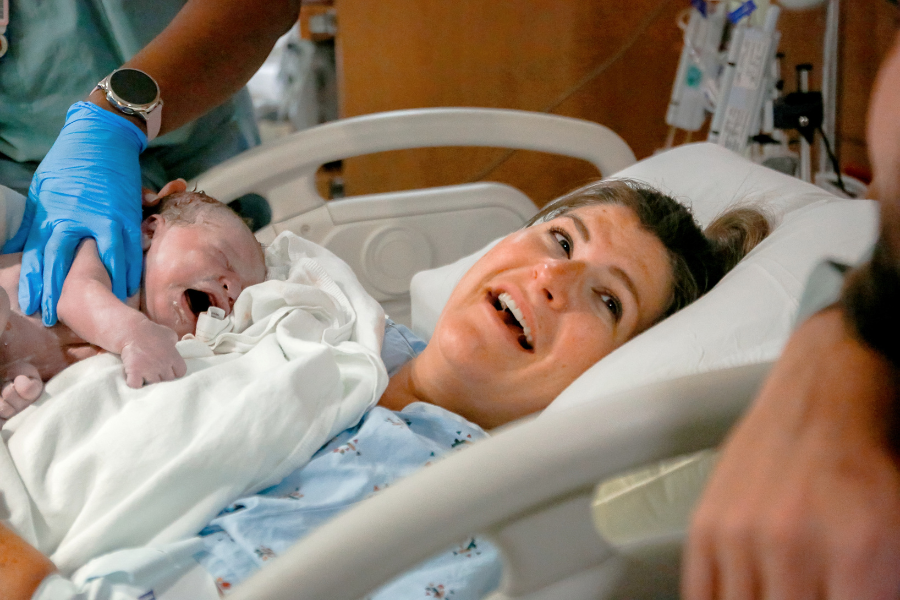I think we all have an image of a pregnant woman’s water breaking in our heads. You know the one. She’s standing on the sidewalk in a busy city, or maybe in the middle of the grocery story, and GUSH. Water dramatically pours onto the floor and she’s instantly in labor.
The thing is, water breaking during pregnancy doesn’t always look like this. In fact, the question of how to tell if your water broke is a whole lot more common in the labor and delivery unit than you may think!
So, it only made sense to get to the bottom of it. Here I’ve compiled all the info you need to know about water breaking during pregnancy.
We’ll discuss what happens when your water breaks, how to tell if your water broke or you peed, and common in-office tests to determine if it’s amniotic fluid or something else.
At the end of this, you’ll have a better idea of what to expect and how to tell if your water broke or not. Ready, mama? Let’s go!
What happens when your water breaks?
This is a question I get a lot over on Instagram in my weekly story questions! Let’s dig into what exactly happens you’re your water breaks and what you can expect here, too.
So, sometimes your water will break BEFORE contractions start, sometimes it will break during labor, and then sometimes your provider may break it artificially if you are in labor and your contractions have slowed down (as a way to speed them up).
But in short, when your water breaks your contractions will either start (if you weren’t already in labor) or they will get a whole lot stronger!
You see once your water breaks, there is no longer any cushioning or padding between baby’s head and your cervix. When the bag of water breaks, baby’s head puts A LOT more pressure onto your cervix. This causes more contractions, which leads to more dilation – yay!
A birth course can help erase this and other unknowns about birth
In my birth course, there’s an entire section dedicated to the anatomy and physiology of childbirth. Specifically, you’ll learn about spontaneous labor, types of contractions, the anatomy of labor, the importance of baby’s position, AND what happens when you water breaks.
And that’s just one of ten sections that will erase the unknown and totally educate you before birth. Learn more to see if it can help YOU have a better birth!
Will I know when my water breaks?
Well, the honest answer to this question is maybe. Even I had a water breaking scare during my second pregnancy where I wasn’t 100% sure what was going on.
Here are the two typical scenarios that happen if/when your water breaks and you haven’t started labor yet:
1. A dramatic gush
All of a sudden you feel a HUGE gush! It literally feels like you peed your pants, but you didn’t! And it’s not stopping! It may have happened while you were sleeping, at the grocery store, sitting on the couch, ANYWHERE.
It’s really unpredictable, but don’t let your anxiety about this get the best of you. If your water breaks in public (and gets all over the place), most people understand. And you’re going to have bigger things on your mind – because that baby is coming!
2. A slow trickle
You may feel a little trickle and wonder “did my water break?”. Sometimes this happens and we call it a slow leak. When this happens, it also will not stop.
Once your water breaks, even if it’s a slow trickle it will continue to come out in little drops/spurts. In this scenario, it’s far less dramatic, and this is usually when mamas have that doubt about whether or not their water broke or not.
But in either water breaking scenario…
In either scenario, I want you to call your provider! If you have a slow trickle kind of situation, they may tell you to put a pad on and continue to walk around or go about your day.
If the pad continues to soak up fluid, it likely IS amniotic fluid. If it doesn’t there’s a better chance that it was pee or discharge.
And one more fun fact? Only about 15% of women have their water break before labor starts! So chances are you’ll already be at the hospital or in active labor when it happens (source).
What about the color when your water breaks?
It’s also important to pay attention to the color you see when your water breaks. Clear fluid is common, meconium stained fluid is less common.
If your water breaks and it has a green hue, it means baby has pooped while still inside you! Generally, this is okay, and nothing really comes of it; however, it COULD be a sign of fetal distress.
But remember, it’s not an absolute indicator of it. I don’t want you to panic if you see brown or green amniotic fluid, but I DO want you to call and mention it to your provider right away so that they can plan accordingly.
If this happens to you, you can expect a few extra professionals at your delivery, because if baby accidentally inhales some of this fluid after birth, he/she could get sick. This will usually be a pediatric team that’s at the ready JUST IN CASE they feel they need to deep suction baby, and get that extra fluid out. This doesn’t happen very often, but sometimes it does, and that’s why they’re there!
How to tell if your water broke
Mama, it’s definitely a myth that you’ll absolutely know when your water breaks! We all seem to think it’s going to be a BIG gush like you peed your pants but that’s not always the case.
Remember, the movies don’t tell us everything, hah. For some women, when their water breaks it’s more of a slow trickle like I described above…and it’s a little harder to know for sure what’s going on.
Let’s take a look at the main differences between pee and amniotic fluid as well as vaginal discharge and amniotic fluid to help you figure out what’s going on.
But the bottom line is if you THINK your water broke, call your provider. There are a few simple tests we can do to determine if it has or not (more on this below)!
How to tell if your water broke or you peed?
One of the most common questions we get in triage when mama comes in thinking she broke her water is whether it’s amniotic fluid or pee.
You guys! It’s harder to determine if you peed your pants or your water just broke than you’d think! We all know in pregnancy (especially in the third trimester) it’s easy to pee your pants accidentally. It just happens sometimes!

Here are some tips to determine whether that wetness you just felt is your water breaking or if you did in fact pee your pants.
- Amniotic fluid is clear (or sometimes green-tinged). Urine can be clear (if you are super hydrated) but usually has at least a bit of a yellow tinge
- Urine smells like urine. Amniotic fluid doesn’t smell like urine, it has a very distinct odor that’s VERY different than urine
- Amniotic fluid typically keeps coming out, regardless of what you do! If your water breaks, you’re going to continue to feel leaks (usually) even if you are lying in bed and not moving
What’s the difference between amniotic fluid and vaginal discharge?
Most often I hear about women who aren’t sure if they peed or their water broke. But sometimes there’s uncertainty about whether it’s vaginal discharge or amniotic fluid.
Some of us have some serious discharge during pregnancy, and it really CAN be hard to tell the difference. Especially if your water breaking is more like a slow trickle.
The big difference between vaginal discharge and amniotic fluid is the consistency.
- Vaginal discharge is going to be a lot stickier, or slipperier (or like egg-whites)
- Amniotic fluid is essentially the consistency of water
4 in-office tests to check if your water broke
Okay so if you think your water broke but you’re not TOTALLY sure, your provider will likely have you come in for a few in-office tests. Remember, your water breaking is not an emergency, but it is important that we figure out what’s going on to plan for next steps.
I’ve said it a lot already, but calling is so, so important whether you know 100% your water broke or you have no idea. Only your provider can tell YOU what the next course of action should be.
But if you do end up going in for some tests to see whether it’s amniotic fluid or not, these are the four most common tests. There is a fifth test they sometimes do called an Amnisure test that can sometimes be done in-office or at the hospital. However, the four I’m describing below are a lot more common and can pretty much always determine what’s going on.
1. Speculum Exam to check for pooling
So, the first test your provider will do is a speculum exam. They have you get up on the table and take a look at what’s going on inside your vagina with a speculum. They’ll be checking to see if there is the presence of any liquid pooling in there.
If there is a pool of liquid that’s a positive that your water probably did break…which leads to the next test!
2. Nitrazine paper test
Next, your provider will take a sample of that fluid that they found pooled inside you during the speculum exam. They’ll test the fluid using Nitrazine paper.
Nitrazine paper is basically just PH paper, and it will turn a certain color if it’s amniotic fluid.
3. Checking fluid under a microscope
For test three, they will take a sample of that pooled fluid and put it on a microscope slide. They’ll take a look at it under a microscope and look for what’s known as ferning. This is a pattern that happens with amniotic fluid that lets them know it’s different than vaginal fluid, blood, or anything else that could be in your vagina.
If your provider sees the ferning pattern when they take a look under the microscope this is another positive sign that you did break your water!
4. Ultrasound to check your AFI
Lastly, your provider may want to do an ultrasound to check your amniotic fluid index. This is basically a test to check how much fluid is in there. Your provider would do this if some of the other tests came back positive or inconclusive.
The idea is that when they check on the amount of fluid during an ultrasound, and if the amount comes back really low, it may indicate that your water probably did break!
Related Reading: Amniotic Fluid Levels

What about preterm PROM and pregnancy?
Say what? PPROM is the abbreviation for preterm premature rupture of membranes. This is a pregnancy complication wherein your water breaks before you are full term! Preterm PROM complicates about 1% of deliveries overall, and it is twofold more common in African Americans (source).
If this happens, you have an increased risk of infection and an increased chance of going into preterm labor – which is labor before 37 weeks.
And, yep. Preterm labor can mean a preterm birth. And we want baby to stay in there as long as possible!
So here’s what might happen if your water breaks BEFORE you’re full term:
- You’ll be put on bed rest in the hospital so we can closely monitor baby
- You’ll be given a steroid shot to help baby’s lungs develop more rapidly
- Other medications may be used to delay the onset of labor
- Antibiotics might be administered to prevent infection
And here are some factors that might increase your risk of PPROM
- Uterine infection
- Overstretching of the uterus (this can happen in pregnancy with multiples or if you have too much amniotic fluid)
- Trauma to your abdomen (for example a fall or car accident)
- History of preterm labor or pPROM in past pregnancies
- Smoking during pregnancy
The thing is, this really can happen to anyone! While those risk factors might increase the chance, sometimes we don’t know why it happens.
So as you’ve learned in this article, it can be harder than you’d think to tell if your water broke! If you have any inclination that your water has broken, and especially if you’re preterm – please call your provider!
We will do one of the four tests described above to figure out what’s going on, and then we’ll decide on a course of action to keep you and baby as safe as possible.
Wrapping up: What should I do if my water breaks?
Now you have a better idea of what to expect if and when your water breaks before labor begins. No matter what the sensation feels like, I recommend checking in with your provider.
If there’s some uncertainty about whether it’s amniotic fluid or not, you may be asked to head in for some of the tests described above.
If there’s no doubt about it – your water definitely broke – your provider may have you hang out at home and wait for labor to ramp up. Typically, labor will begin within a few hours or up to 24 hours after your water breaks (source).
And finally, if your water broke and you…
- Tested positive for GBS
- See green or brown amniotic fluid
- Are less than 37 weeks pregnant
- Can see some of the cord hanging out of your vagina
- Or have any other serious concerns
…make a call, and head to the hospital L&D unit right away! We’d rather see you at triage and make a safety assessment (or keep you here!) than have an emergency go unseen or untreated.
Happy birthing, mama!





